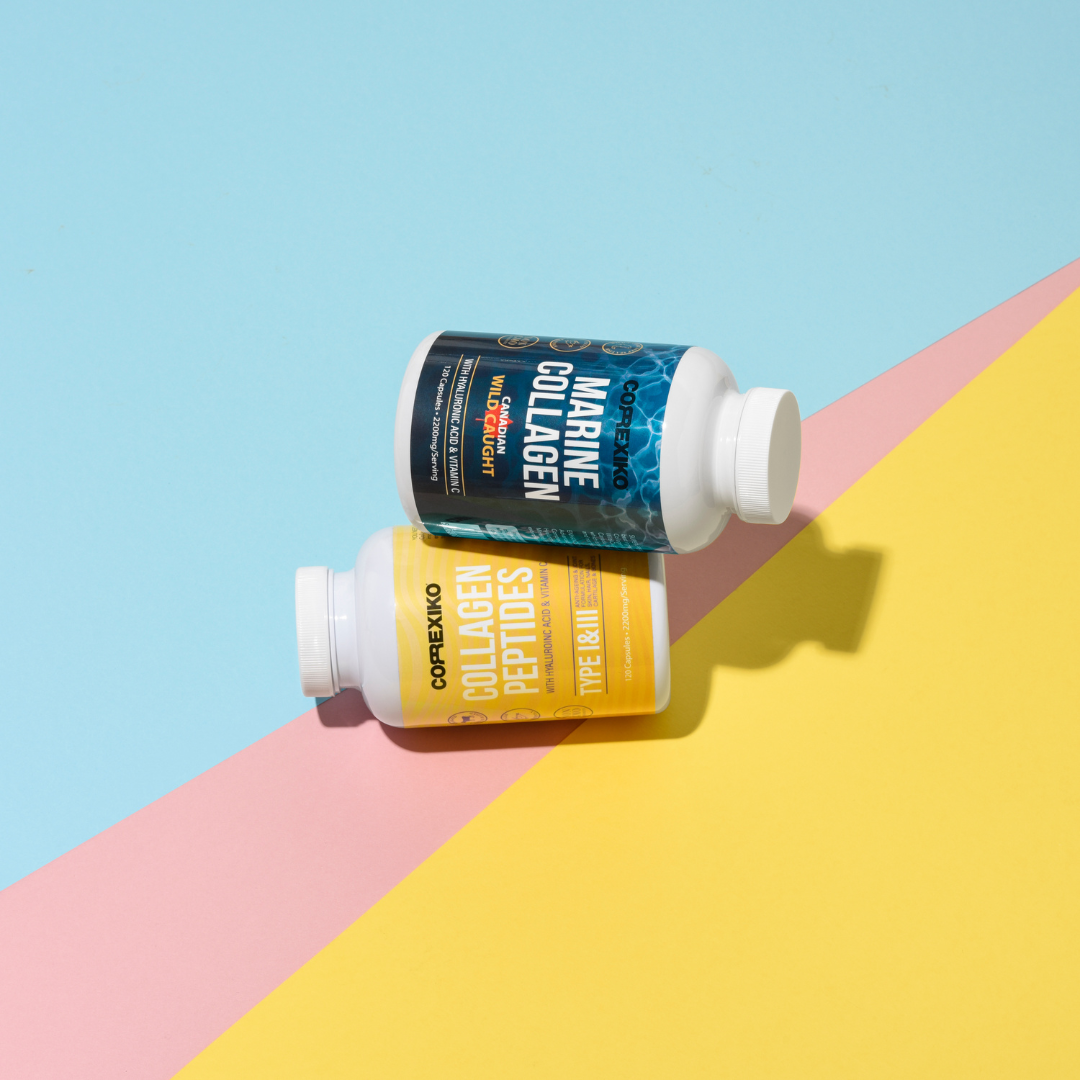Supplements are a great way to boost your nutritional and physiological health. Collagen supplements, which are made of hydrolyzed collagen, are one such ingredient. While it claims to support healthy joints, skin, hair, and nails, are collagen supplements really worth it?
What Is Collagen?
Collagen is a simple protein that your body produces naturally to help it support skin, bones, tendons, ligaments, and joints. Collagen supplements have gotten a lot of attention lately, with some claiming that taking a collagen supplement can “fill in your wrinkles.” This is probably one of the more ridiculous claims regarding collagen supplements since wrinkles are caused by loss of elasticity, not diminishing collagen. However, they do actually have some legitimate benefits, including helping to increase skin elasticity, as well as healing and reducing joint and muscle pain.
Of course, so many of us are worried about how our skin looks as we get older. That fear that wrinkles will take up most of the face and be there even when we aren’t making an expression does haunt people’s minds. Luckily, with collagen increasing skin elasticity, there is hope, but for some people that is not enough, which is why they will turn to a Beverly Hills deep plane facelift surgeon, or one in their area, to go over with them what else can be done cosmetically. This is one avenue as there are others, but it is worth it if it is the only reason someone is taking collagen is to look youthful.
Does Collagen Work?
Collagen supplements have gained a lot of attention recently, and for good reason. Collagen is a crucial protein in your bodies that plays a key role in maintaining skin elasticity, supporting joint health, and overall tissue structure. As you age, your natural collagen production declines, which can lead to issues such as wrinkles, joint stiffness, and weakened skin. Many people turn to collagen supplements to help replenish and support their body’s collagen levels. Research suggests that collagen supplementation may enhance your skin hydration, elasticity, and overall appearance. Studies also indicate potential benefits for joint health, with some individuals reporting reduced joint pain and improved mobility with regular use of collagen supplements.
Benefits of Collagen Supplements
Collagen plays a vital role in keeping your hair, skin, and nails strong, supple, and youthful. By taking collagen supplements, you can help boost and support your body’s natural collagen levels, which in turn promotes moisture retention and elasticity, particularly during sleep. These supplements are also thought to benefit joint health, and digestion, contributing to overall wellness. With so many collagen supplements on the market, knowing which one is best can be difficult. One of the most favored forms is collagen powder, which is often blended into beverages such as tea, coffee, and shakes. Alternatively, you can also opt for collagen capsules or pills from platforms like Lifespan Dermatology™, which can be taken like any other dietary supplements. And, if skincare is your focus, collagen topicals such as creams and serums can provide a direct application to your skin.
While collagen supplements have become increasingly popular due to their potential benefits for promoting skin elasticity and joint health, it’s important to note that they may not fully address specific concerns such as hair loss. Hair health is influenced by a variety of factors, including genetics, hormonal balance, diet, and overall health. While collagen plays a role in supporting hair follicle health and strength, the direct impact of collagen supplements on hair growth and hair loss prevention requires further study. Thus, for those grappling with thinning hair or balding, seeking professional intervention such as a hair transplant can offer a more targeted and effective solution. A hair transplant, conducted by skilled professionals at a reputable hair clinic in cardiff (or elsewhere), can restore thicker, fuller hair by transplanting healthy follicles from donor areas to areas of thinning or balding.
Do Collagen Supplements Have Side Effects?
Collagen supplements are all the rage lately. They’re the trendy way to make sure you’re getting enough collagen in your diet and that they’re good for you. But, as with any supplement, collagen supplements have side effects. Fortunately, these side effects are typically mild and temporary.
Collagen is the most abundant protein in the human body, making up approximately 25% of the protein in our bodies. It is abundant in the skin, connective tissues, and tendons-and as we age, our collagen production diminishes, resulting in wrinkles, joint pain, and brittle nails. For those looking to support their skin and joint health even further, visiting a Spa near me in Center Valley, PA or in your area, can complement the benefits of collagen by promoting relaxation and improving circulation. Good sources of collagen include seafood, chicken, beef, eggs, and organ meats like liver, kidney, and tongue. Supplementing the diet with collagen may help reverse the signs of aging.
What Causes Collagen Loss?
Collagen loss is one of the major causes of wrinkles and other signs of aging. As we age, our natural collagen production decreases, which ultimately leads to visible signs of aging. Fortunately, there are things that we can do to slow this process down. Some of the most effective anti-aging remedies also happen to be the best sources of collagen, so be sure you incorporate them into your diet.
Collagen is the most abundant protein in the human body. It is a structural protein that is found in the skin, bones, tendons, ligaments, gut, blood vessels, muscles, eyes, and connective tissue. Collagen loss can lead to wrinkles, brittle nails, and sagging skin. Collagen loss can also be a sign of an underlying medical condition.
Collagen supplements are collagen-infused formulas that claim to improve your health. Collagen supplements are all the rage right now, with people claiming great results from ingesting the supplement.

